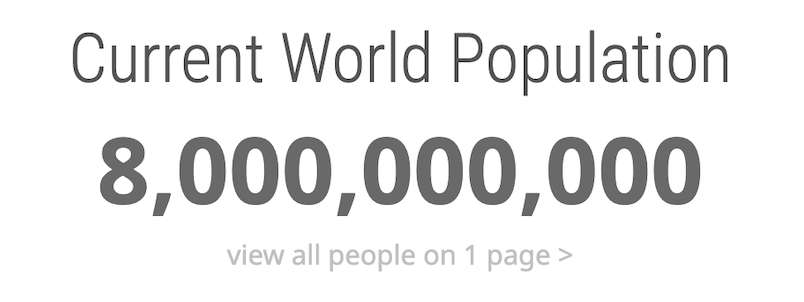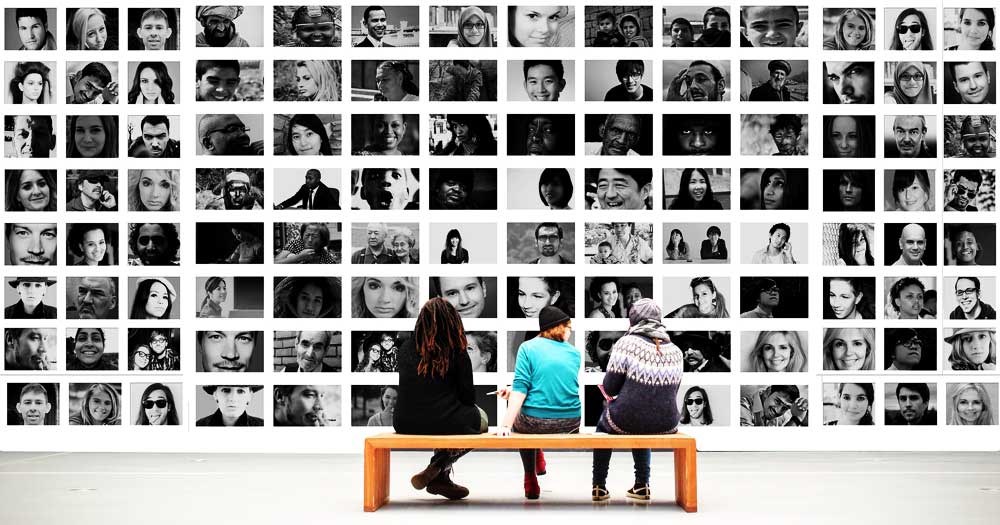Today, 15 November 2022 8am GMT, the world’s population reached 8 billion people. This remarkable milestone has been achieved just over a decade after we reached 7 billion in 2011, and it is estimated that we will continue to grow at a rapid pace over the coming years.

What Does 8 Billion People Mean For The World?
Many have attributed this rapid growth to advances in healthcare, improved access to education, and other factors that have enabled people to live longer and lead healthier lives.
However, as we continue to grow at an unprecedented rate, there are concerns about how we will be able to support and sustain this large population. After all, the biggest concern is that whether we have 5, 8, 10, or 20 billion people everyone will demand the same quality of life as everyone else, but it isn’t possible or sustainable, which naturally translates into big global issues, such as poverty, unhappiness, rising CO2 emissions, and climate change.
Despite these challenges, there are also opportunities associated with 8 billion people. For example, economies can benefit from new innovations and technologies that arise as a result of increased access to resources, larger markets for goods and services (economies of scale), and more skilled workers.
As we look to the future, it will be critical for policymakers and communities around the world to come together and develop strategies to manage this growth in a way that is sustainable and equitable for everyone. And it will be up to all of us – governments, businesses, and citizens alike – to play our part in creating a better world for 8 billion people.
Challenges Associated With 8 Billion People?
As I was born, there were approximately 5 billion people in the world. Today, there are 8 billion people – almost double. Naturally, there are many challenges associated with having these many people, and these can be broadly categorized into issues related to:
- Lack of natural resources, such as food, water, energy, and other natural resources;
- Social issues, including poverty, education inequality, and health care access; and
- Environmental concerns, including climate change and rising CO2 emissions.
For example, a major challenge we are facing is that 8 billion people will put a lot of strain on our natural resources, such as our land, water, and energy resources. This can lead to increased competition for these limited resources, which in turn may contribute to conflicts and even wars.
To address these challenges, we will need concerted efforts from governments, businesses, and citizens alike – whether that’s developing new technologies to increase food production or investing in alternative sources of energy. Only by working together can we hope to ensure that 8 billion people have a sustainable future.

Opportunities Associated With Population Growth?
We can’t deny that 8 billion people is a lot of mouths to feed, but it also presents many opportunities. For example, this large population base means that there are more consumers in the market and economies of scale for businesses.
Additionally, 8 billion people creates a larger pool of skilled workers who can contribute to innovation and technological advancements. This helps to fuel economic growth and improve standards of living, especially in developing countries where access to education and resources may be limited.
Still, while 8 billion people pose many challenges that we need to address, it also presents opportunities if we are willing to work together towards a common goal. We must continue to invest in new technologies and resources, support economic development, and promote policies that enable all people to live healthy, productive lives. Only then can 8 billion truly become the world’s greatest asset.
What’s Next For The World’s Population?
Given the rapid growth of 8 billion people, it is clear that we will continue to see major changes in the years ahead. Some experts predict that we could reach 9 or even 10 billion people in the coming decades, and this will present new challenges as well as opportunities for our global community.
The world’s population reached:
- 1 billion in 1804
- 2 billion in 1927 (123 years for an extra billion)
- 3 billion in 1960 (53 years for an extra billion)
- 4 billion in 1974 (14 years for an extra billion)
- 5 billion in 1987 (12 years for an extra billion)
- 6 billion in 1999 (12 years for an extra billion)
- 7 billion in 2011 (12 years for an extra billion)
- 8 billion in 2022 (11 years for an extra billion)
Looking at the future, population growth is said to a decline due to declining yearly growth rate which fell from 2% in 1972 to 1% in 2020. Still, today, every day, people are being born in the millions, meaning that despite the best efforts of governments, NGOs, and other organizations around the world, 8 billion will continue to grow exponentially in the years ahead.
Some experts predict that we could see 9 or even 10 billion people in the coming decades, especially as advances in healthcare, nutrition, and other areas help to improve the overall quality of life.
Is Population Growth Unsustainable?
There is no simple answer to this question, as it depends on a number of factors, including the economic and social conditions in different regions of the world.
On one hand, some experts argue that 8 billion people may be too many for our planet to sustain in the long-term. Because of our growing population and consumption patterns, we are putting a tremendous strain on our natural resources, such as our land and water, which can have serious environmental impacts.
On the other hand, many proponents of population growth argue that 8 billion people is actually not an unmanageable number, given advances in technology and development efforts that increase food production, improve resource efficiency, and promote sustainable consumption.
Still others suggest that with proper planning and adequate investment in emerging economies like Africa and Asia, 8 billion people could be a blessing rather than a burden for the world.
Ultimately, whether population growth is sustainable will depend on how well we manage this global challenge moving forward – something that will require cooperation from governments, businesses, organizations, communities, and individuals alike.
How To Get Involved In Population-Related Initiatives?
If you are interested in contributing to efforts to address the challenges and opportunities associated with 8 billion people, there are a number of organizations that you can get involved with. Some examples include UNFPA, Population Connection, and Population Institute.
Whether through volunteering or financial support, there are many ways for individuals to make a difference in this important area.
Fun Facts About Population Growth
According to WorldoMeters, so far this year we had:
Births this year
116,869,549
Deaths this year
58,522,795
In other words, for every death, we have 2.01 births, which means the population is growing by about 205 million people per year!
The countries with the highest birth rate are:
- Niger
- Chad
- Mali
- Somalia
- Angola
- Burundi
- South Sudan
- Liberia
- Congo (Kinshasa)
- Mozambique
The countries with the lowest birth rate are:
- Singapore
- Taiwan (Province of China)
- Japan
- Hong Kong SAR, China
- Macao SAR, China
- South Korea
- Italy
- Spain
- Germany
- Poland
Which countries have a negative birth rate?
Experts believe that some countries with low birth rates, such as Japan and South Korea, may actually be experiencing a demographic shift known as population aging. This is because their older populations are increasing faster than their younger populations, leading to fewer births in total. Other countries, including Italy and Spain, may also be facing similar demographic challenges due to low birth rates and declining populations.
Despite these challenges, however, some experts believe that a negative birth rate may not necessarily be a bad thing – as it could help to reduce pressure on natural resources, promote sustainability, and ease concerns about overpopulation in the long term. In fact, some countries like Singapore have implemented policies to encourage a downward shift in birth rates.

Top 20 Largest Countries by Population
- China (1.4 billion people)
- India (1.3 billion people)
- United States (327 million people)
- Indonesia (260 million people)
- Brazil (207 million people)
- Pakistan (199 million people)
- Nigeria (198 million people)
- Bangladesh (166 million people)
- Russia (144 million people)
- Japan (126 million people)
- Mexico (127 million people)
- Philippines (103 million people)
- Ethiopia (103 million people)
- Vietnam (96 million people)
- Egypt (93 million people)
- Germany (82 million people)
- Turkey (81 million people)
- Iran (81 million people)
- Thailand (69 million people)
- France (67 million people)
8 Billionth Symbolic Baby

In related news, Manila is now celebrating 8 billion people in the world with what they call the “8 Billionth Symbolic Baby,” giving this honor to a baby girl born in Tondo, Manila, delivered at Dr. Jose Fabella Memorial Hospital in Manila on early Tuesday, November 15th.
The interesting part about this delivery is that no one can be certain about whether this baby was actually the 8th billionth one or not, but they were long ago preparing to announce this baby with a cake, fliers, and media coverage. To me, this speaks about the power of seizing the moment and good preparation.
Population Growth and Global Happiness
Overall, it is my opinion that many of the current problems that we are experiencing as a society, such as war over limited resources, COVID, accommodation crisis, etc. are issues directly related to the population growth and they won’t become any less significant in the upcoming years.
In fact, I predict that in upcoming years, we will have even more new issues that will be directly or indirectly connected to the global population growth, which in turn will affect our well-being. After all, every person in the world wants to have a similar level of income, wealth, and access as everyone else.
We are already unable to provide an average American level of living to everyone on Earth, not to mention the level of living reserved to the rich, which most people aspire for. In other words, something has to give, and many of the problems that we are facing today in the world are the direct result of us reaching 8 billion people.
So, will the new AI boom, or some other technology, save us from ourselves in the future, or will these and other problems accumulate into something we won’t be able to deal with. Only time will tell.
Yet, today, we can at the very least acknowledge this major event, which is that today officially we have 8 billion people in the world. Wow!















